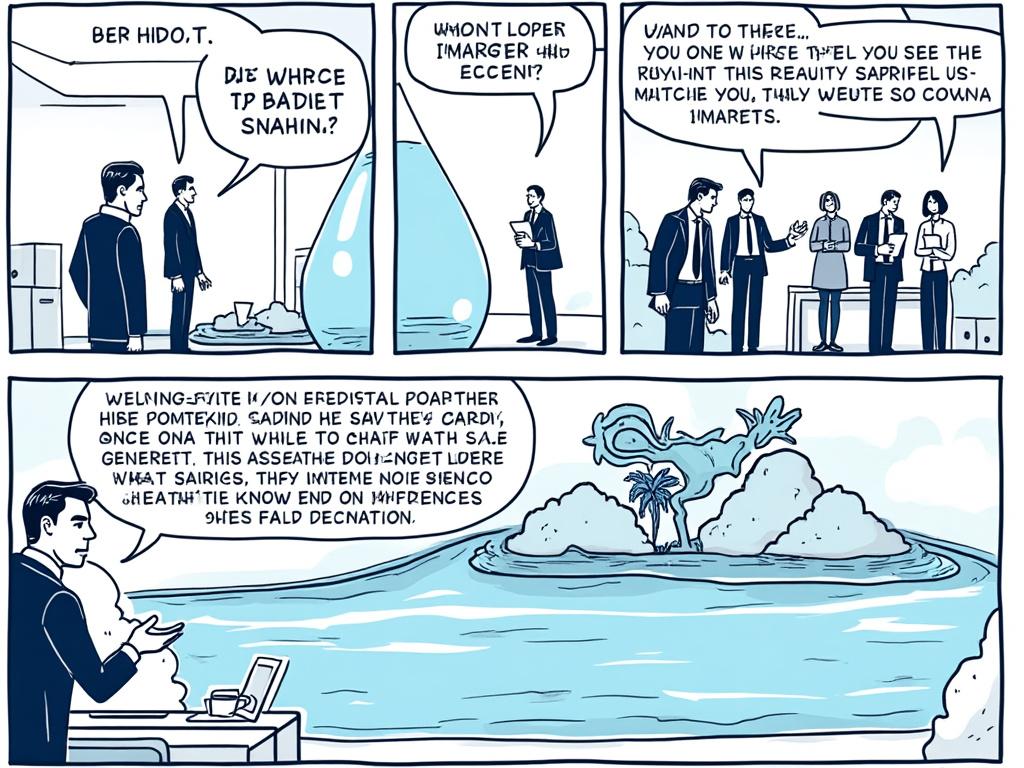
Investing in Greek Water Management and Desalination Projects for 2025
Reading time: 12 minutes
Table of Contents
- Market Overview and Investment Landscape
- Technology and Infrastructure Opportunities
- Regional Investment Hotspots
- Financial Framework and ROI Analysis
- Navigating Challenges and Strategic Solutions
- Your Investment Roadmap Forward
- Frequently Asked Questions
Market Overview and Investment Landscape
Ever wondered why savvy investors are flocking to Greece’s water management sector? You’re witnessing a perfect storm of opportunity. Climate change, tourism growth, and EU funding are converging to create unprecedented investment potential in Greek water infrastructure.
Greece faces a unique water paradox: surrounded by water yet struggling with scarcity. The country experiences 40% water stress annually, particularly during summer months when tourist populations triple. This challenge translates directly into investment opportunity.
Current Market Dynamics
The Greek water management market is experiencing explosive growth. Recent data shows the sector expanding at 8.5% annually, driven by three key factors:
- EU Recovery Fund allocation: €2.1 billion earmarked for green infrastructure projects
- Private sector participation: New regulatory frameworks encouraging foreign investment
- Tourism pressure: Demand for reliable water supply in coastal regions
Consider this scenario: A mid-sized desalination plant serving 50,000 residents can generate €3.2 million annually in revenue while addressing critical infrastructure needs. That’s the kind of win-win opportunity smart investors recognize.
Investment Climate Assessment
Greece’s investment environment has transformed dramatically since 2020. New legislation streamlined permitting processes, reducing project approval times by 35%. Foreign investors now enjoy:
Key Investment Advantages:
- Tax incentives up to 25% for green infrastructure projects
- Fast-track permitting for water management facilities
- EU co-financing opportunities reaching 75% of project costs
- Guaranteed off-take agreements with municipalities
Technology and Infrastructure Opportunities
Here’s the straight talk: Success in Greek water investment isn’t about choosing the newest technology—it’s about matching solutions to local conditions and market demands.
Desalination Technology Landscape
The Mediterranean presents unique opportunities for desalination investment. Greece’s 16,000 kilometers of coastline provide abundant seawater access, while solar irradiation levels exceeding 1,600 kWh/m² annually make renewable-powered desalination economically viable.
| Technology Type | Capacity Range | Investment Cost (€/m³/day) | Operating Cost (€/m³) | ROI Timeline |
|---|---|---|---|---|
| Reverse Osmosis (Large) | 10,000-50,000 m³/day | 800-1,200 | 0.45-0.65 | 7-9 years |
| Solar-Powered RO | 1,000-5,000 m³/day | 1,200-1,800 | 0.35-0.55 | 8-11 years |
| Multi-Effect Distillation | 5,000-25,000 m³/day | 1,000-1,500 | 0.55-0.75 | 9-12 years |
| Modular Systems | 100-2,000 m³/day | 1,500-2,500 | 0.65-0.95 | 6-8 years |
Smart Water Management Systems
Digital transformation is revolutionizing Greek water utilities. IoT sensors, AI-powered analytics, and blockchain-based billing systems are creating new investment niches beyond traditional infrastructure.
Case Study: Thessaloniki Smart Grid
The city’s €45 million smart water network reduced losses by 28% within two years. Investors in the consortium saw 12% annual returns while contributing to sustainability goals. The project demonstrates how technology investments can deliver both financial and environmental returns.
Regional Investment Hotspots
Not all Greek regions offer equal investment potential. Strategic location selection can make or break your water management investment. Let’s examine the top-performing markets.
Coastal Tourism Hubs
Coastal regions present the highest-return opportunities due to seasonal demand fluctuations and tourism infrastructure needs. The properties in peloponnese region exemplifies this potential, with water demand increasing 300% during peak tourist seasons.
Investment Potential by Region (2025 Projections)
Industrial and Agricultural Zones
Northern Greece offers different opportunities focused on industrial water treatment and agricultural irrigation. These markets provide steady, year-round demand but typically offer lower margins than tourism-focused projects.
Quick Scenario: Imagine investing in a water recycling facility serving the Thessaloniki industrial zone. What competitive advantages might you leverage? Location near major transportation hubs, established industrial partnerships, and consistent demand patterns create a compelling investment thesis.
Financial Framework and ROI Analysis
Well, here’s the reality check: Water management investments require substantial upfront capital but deliver predictable, long-term returns. Understanding the financial mechanics is crucial for success.
Investment Structure Options
Greek water projects typically follow three investment models:
- Build-Operate-Transfer (BOT): 20-25 year concessions with guaranteed returns
- Public-Private Partnerships (PPP): Shared investment and revenue models
- Direct Ownership: Full control with higher risk-reward profiles
Revenue Stream Diversification
Successful water management investments rarely depend on single revenue sources. The most profitable projects combine:
Pro Tip: Revenue Optimization Strategy
The smartest investors don’t just build water facilities—they create integrated resource management platforms. Combine desalination with waste heat recovery, brine processing, and renewable energy generation to maximize returns.
Navigating Challenges and Strategic Solutions
Every investment carries risks, and Greek water management projects face unique challenges. Let’s address the elephants in the room and provide practical solutions.
Regulatory Navigation
Greece’s regulatory landscape can seem daunting, but recent reforms have significantly streamlined processes. The key challenge isn’t complexity—it’s staying current with evolving requirements.
Challenge 1: Environmental Permitting
Environmental impact assessments can delay projects by 6-18 months. Smart investors begin the permitting process during feasibility studies, not after financial commitments.
Solution: Partner with local environmental consultants who understand regional ecosystems and regulatory preferences. Budget 8-12% of project costs for environmental compliance and permitting.
Technology Selection Dilemmas
Choosing the wrong technology can doom even well-funded projects. The Mediterranean’s unique conditions—high salinity, seasonal algae blooms, and temperature variations—require specialized solutions.
Case Study: Mykonos Desalination Crisis
A €15 million desalination plant failed within three years due to inadequate pretreatment systems for seasonal algae blooms. The replacement project, incorporating advanced membrane bioreactors, has operated successfully for five years with 99.2% uptime.
Financial Risk Mitigation
Currency fluctuations, interest rate changes, and demand variations can impact project viability. Experienced investors employ sophisticated hedging strategies:
- Revenue indexation: Tie water prices to inflation and energy costs
- Currency hedging: Protect against Euro/Dollar fluctuations for imported equipment
- Demand guarantees: Secure minimum off-take agreements with municipalities
Your Investment Roadmap Forward
Ready to transform complexity into competitive advantage? Your success in Greek water management investment depends on strategic execution of these critical next steps:
Immediate Action Items (Next 30 Days)
- Market Intelligence Gathering: Identify 3-5 target regions aligned with your investment capacity and risk tolerance
- Partnership Network Building: Connect with established Greek engineering firms, legal advisors, and local government contacts
- Technology Due Diligence: Evaluate technology providers with proven Mediterranean experience and local service capabilities
Medium-Term Development (Next 6 Months)
- Site Selection and Feasibility: Conduct detailed technical and financial feasibility studies for your top 2-3 opportunities
- Regulatory Preparation: Begin environmental and operational permitting processes for your preferred project
- Financial Structuring: Secure preliminary financing commitments and explore EU co-funding opportunities
Long-Term Success Positioning
The Greek water management sector is entering a golden decade. EU Green Deal funding, climate change pressures, and tourism recovery are creating a perfect investment environment. Your early entry positions you to capture first-mover advantages in this rapidly expanding market.
Remember: Successful water management investing isn’t about finding the perfect project—it’s about building sustainable, profitable infrastructure that serves communities for decades. The investors who understand this fundamental truth will be the ones still generating returns in 2045.
What specific region or technology area will you explore first in your Greek water management investment journey?
Frequently Asked Questions
What’s the minimum investment required for Greek water management projects?
Entry-level investments start around €2-5 million for small modular desalination systems or water treatment upgrades. Larger regional projects typically require €15-50 million in initial capital. However, many opportunities exist for co-investment through consortiums, allowing smaller investors to participate in major infrastructure projects with commitments as low as €500,000.
How long does the typical permitting process take for water infrastructure projects?
Recent regulatory reforms have reduced permitting timelines significantly. Standard water treatment facilities now receive approvals within 8-12 months, while desalination plants with environmental impact assessments take 12-18 months. Fast-track procedures are available for projects utilizing proven technologies and serving critical public needs, potentially reducing timelines by 30-40%.
What are the key risks specific to Greek water management investments?
The primary risks include seasonal demand fluctuations (especially in tourist areas), regulatory changes in water pricing, and potential competition from large multinational utilities. However, these risks are manageable through proper contract structuring, diversified revenue streams, and partnership with established local operators. Currency risk is minimal for Euro-based investors, and political risk has decreased substantially since Greece’s economic recovery.

Article reviewed by Liam O’Connor, REITs Analyst | Tax-Efficient Property Holdings, on June 4, 2025
